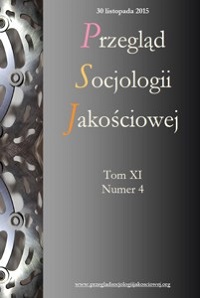What Is It All About in the Interview? An Attempt to Interpret the Memories About the Jews as Narratives of Identity
DOI:
https://doi.org/10.18778/1733-8069.11.4.01Keywords:
Interpretation of Interview, Memory, Narrative of Identity, Jews, AntisemitismAbstract
The article presents a method of interpreting in-depth interviews regarding the ways in which non-Jewish Poles remember Jews. The intention of the suggested method is to find a new perspective that would be complementary to the two most important ones that can be found in the Polish research on this subject: the ethnographic approach and the perspective inspired by psychoanalysis. The main assumption of the presented method is that an interview is not a recollection of the past but a narrative of identity in which the past is (re)constructed according to the imperatives of the present in which the interview is conducted, and the Jews serve to an interviewee only as a frame of reference for his/her constructs of identity. It is further assumed that narratives of identity are constructed along four main dimensions: sacrum, death, sex, and power/violence, each with its own cultural semantics and binary code that is used to separate practices and beliefs that characterize “Us” from those we attribute to “Them.” These codes, together with stories about “Us” and “Them,” make the warp and weft of the narrative identity represented in the interview, which corresponds to Clifford Geertz’s idea of culture as the webs of significance we have spun and in which we are entangled. Then, a single interview has been selected and interpreted to show how the interviewee organizes his stories about Jews in different semantics and codes to keep his narrative of identity consistent.
Downloads
References
Bauman Zygmunt (1992) Mortality, Immortality, and Other Life Strategies. Cambridge: Polity Press.
Google Scholar
Benz Wolfgang (2004) Anti-Semitism in Europe. Traditions, Structures, Manifestations. Uppsala: Uppsala University.
Google Scholar
Burke Peter J. (2013) Identity, Social [w]: Byron Kaldis, ed., Encyclopedia of Philosophy and the Social Sciences, vol. 1. Los Angeles: Sage, s. 453–457.
Google Scholar
Cała Alina (1987) Wizerunek Żyda w polskiej kulturze ludowej. Warszawa: Uniwersytet Warszawski.
Google Scholar
Cała Alina (1992) Wizerunek Żyda w polskiej kulturze ludowej. Warszawa: Wydawnictwa UW.
Google Scholar
Forecki Piotr (2010) Od „Shoah” do „Strachu”. Spory o polsko-żydowską przeszłość i pamięć w debatach publicznych. Poznań: Wydawnictwo Poznańskie.
Google Scholar
Geertz Clifford (1973) The Interpretations of Culture. New York: Basic Books.
Google Scholar
Grabowski Jan (2011) Judenjagd. Polowanie na Żydów 1942‒1945. Studium dziejów pewnego powiatu. Warszawa: Stowarzyszenie Centrum Badań nad Zagładą Żydów.
Google Scholar
Kapralski Sławomir (1999) People of Different Times [w:] tenże, ed., The Jews in Poland, vol. 2. Kraków: Judaica Foundation.
Google Scholar
King Anthony (2004) The Structure of Social Theory. London: Routledge.
Google Scholar
DOI: https://doi.org/10.4324/9780203646694
Kurowski Marek M. (2004) Paradoks i ironia, czyli krótki kurs socjologii Niklasa Luhmanna. „Rubikon. Kwartalnik Naukowy” nr 1‒4, s. 79–98.
Google Scholar
LaCapra Dominick (2001) Writing History, Writing Trauma. Baltimore: The Johns Hopkins University Press.
Google Scholar
Lynch Michael (1993) Scientific Practice and Ordinary Action. Ethnomethodology and Social Studies of Science. Cambridge: Cambridge University Press.
Google Scholar
DOI: https://doi.org/10.1017/CBO9780511625473
Ricoeur Paul (2003) O sobie samym jako innym. Przełożył Bogdan Chełstowski. Warszawa: Wydawnictwo Naukowe PWN.
Google Scholar
Roskies Diane K., Roskies David G. (1979) The Shtetl Book. An Introduction to East European Jewish Life and Lore. Jersey City, NJ: KTAV Publishing House.
Google Scholar
Schütz Alfred (1962) Common-Sense and Scientific Interpretation of Human Action [w:] tenże, Collected Papers, vol. 1: The Problem of Social Reality. The Hague: Nijhoff, s. 3–47.
Google Scholar
DOI: https://doi.org/10.1007/978-94-010-2851-6_1
Skarga Barbara (1997) Tożsamość i różnica. Eseje metafizyczne. Kraków: Wydawnictwo Znak.
Google Scholar
Stomma Ludwik (1986) Antropologia kultury wsi polskiej XIX w. Warszawa: Instytut Wydawniczy PAX.
Google Scholar
Tokarska-Bakir Joanna (2004) Rzeczy mgliste. Eseje i studia. Sejny: Pogranicze.
Google Scholar
Tokarska-Bakir Joanna (2008) Legendy o krwi. Antropologia przesądu. Warszawa: Wydawnictwo W.A.B.
Google Scholar
Vaitkus Steven (1991) How Is Society Possible? Dordrecht: K luwer Academic Publishers.
Google Scholar
DOI: https://doi.org/10.1007/978-94-009-2077-4
Waldenfels Bernhard (2002) Topografia obcego. Przełożył Janusz Sidorek. Warszawa: Oficyna Naukowa.
Google Scholar
White Harrison C. (2011) Tożsamość i kontrola. Przełożyła Agnieszka Hałas. Kraków: Nomos.
Google Scholar
Yerushalmi Yosef H. (1996) Zakhor: Jewish History and Jewish Memory. Seattle: University of Washington Press.
Google Scholar
Downloads
Published
How to Cite
Issue
Section
License

This work is licensed under a Creative Commons Attribution-NonCommercial-NoDerivatives 4.0 International License.














